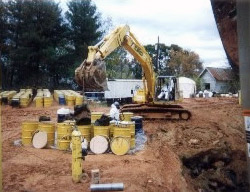Infectious Waste Package, Storage, Transport, Treatment
How should infectious waste be packaged and stored?
- Sharps must be placed in rigid, leak- and puncture-resistant containers secured tightly.
This report looks at the estimated amounts of infectious waste generated in the state in the past and offers an estimate of the amount of waste that may be generated in the state in the next year.
The Resource Conservation and Recovery Act (RCRA) is a federal law enacted the Environmental Protection Agency in 1976 that established a regulatory system to track hazardous wastes from the point of generation to disposal. It established a “cradle to grave” process for management of hazardous waste (spent oil, cleaning agents, pesticides, etc.). The law requires the use of safe and secure procedures in treating, transporting, storing, and disposing of hazardous wastes.
 ean-up actions for thousands of waste management units
ean-up actions for thousands of waste management unitsS.C. Department Of Revenue (SCDOR)
SCDOR issues registrations and collects taxes from dry cleaners operating in the state. Please call 1-844-898-8542 for assistance.
S.C. Small Business Assistance Program (SCSBAP)
Many dry cleaning sites have environmental contamination because of minor leaks and spills of dry cleaning solvents or process wastes. Some leaks occur from containers of solvent or waste stored outside of the dry cleaning plants; however, many problems result from small drips of solvent on the floors inside the dry cleaning operation. Many of these solvent releases occur on a daily basis during normal dry cleaning operations.
Dry Cleaning Facility Restoration Trust Fund
The State Coalition of Remediation of Dry Cleaners (funded by the EPA):